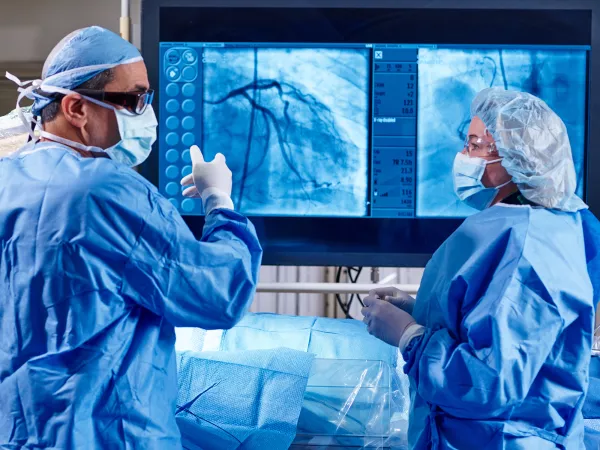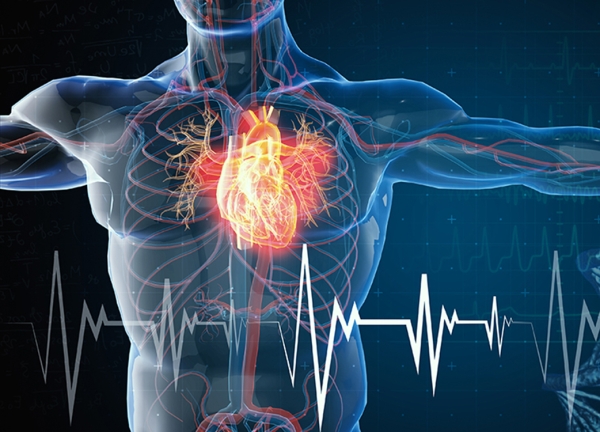What to expect from your first Cardiologist near me appointment
What to expect from your first Cardiologist near me appointment
Blog Article
Recognizing the Importance of Cardiology in Modern Healthcare Solutions
Cardiology plays a critical role in modern health care, especially as heart condition continues to be the leading reason for mortality worldwide. Advancements in diagnostics and therapy have transformed individual treatment, making it possible for earlier treatments and improved outcomes. The change in the direction of preventative cardiology encourages people to manage their health proactively. As innovation remains to progress, the combination of ingenious services may further redefine cardiology's effect on public health and wellness, prompting a closer exam of arising patterns and their ramifications.
The Prevalence of Heart Disease and Its Impact on Public Wellness
Although cardiovascular disease continues to be the leading cause of death around the world, its impact expands far beyond specific patients to affect public health and wellness systems and economies. The high frequency of cardiovascular disease places a significant stress on healthcare resources, necessitating enhanced financing for treatment, rehab, and avoidance programs. Public wellness initiatives need to address threat aspects such as obesity, cigarette smoking, and sedentary way of lives, which add greatly to the increasing occurrence of heart conditions.Moreover, the economic concern connected with heart disease is enormous, incorporating not only direct clinical prices however additionally indirect expenses associated to shed performance and premature mortality. Areas face difficulties in taking care of these prices, typically bring about differences in medical care access and outcomes. As the population ages and lifestyle-related dangers proceed to rise, the urgency for effective cardiology interventions comes to be vital. Attending to heart illness is not just a matter of private health and wellness however likewise a vital public health and wellness top priority.
Advances in Cardiac Diagnostics and Imaging Techniques
Recent developments in cardiac diagnostics and imaging techniques have actually revolutionized the area of cardiology, enhancing the capacity to detect and monitor cardiovascular disease. Strategies such as heart MRI, CT angiography, and echocardiography have actually ended up being progressively sophisticated, providing thorough photos of cardiac structures and features. These methods enable for the early recognition of problems like coronary artery illness, cardiac arrest, and valvular disorders.Moreover, innovations in non-invasive diagnostics, such as wearable innovation and remote tracking devices, have actually equipped patients and doctor. These tools help with real-time monitoring of heart rhythms and other important signs, causing timely treatments. Additionally, fabricated knowledge is being integrated right into imaging analysis, enhancing precision and effectiveness in medical diagnosis.
Developments in Treatment Alternatives for Heart Conditions
Current advancements in cardiology have actually led to substantial innovations in therapy options for heart disease. These consist of sophisticated medical techniques that improve procedural end results and emerging medicines that supply new opportunities for treatment. As the field progresses, these developments play an essential role in enhancing person care and results.
Advanced Surgical Techniques
Technologies in surgical methods have actually changed the landscape of cardiology, offering new wish for patients with heart disease. Minimally invasive procedures, such as catheter-based interventions, have actually substantially decreased healing times and health center stays. Techniques like robotic-assisted surgical treatment boost accuracy, enabling specialists to browse intricate anatomical structures with higher accuracy. Innovations in imaging technology facilitate real-time visualization during procedures, improving outcomes. Transcatheter aortic valve substitute (TAVR) exhibits an advancement in treating aortic stenosis, enabling valve substitute without open-heart surgical treatment. In addition, hybrid techniques that integrate catheter-based and medical techniques offer tailored services for different cardiac issues. These advanced medical methods not just boost person safety and security but likewise expand treatment options, underscoring the crucial function of development in contemporary cardiology practices.
Arising Therapies and drugs
As the landscape of cardiology continues to develop, emerging therapies and drugs play an essential role in enhancing therapy choices for heart disease. Innovations such as unique anticoagulants and advanced lipid-lowering representatives have transformed the monitoring of cardiovascular conditions, considerably reducing person morbidity and mortality. Additionally, the advancement of genetics therapies and regenerative medication uses promising opportunities for treating problems formerly deemed irreversible. Medical tests are continuously revealing the effectiveness of these treatments, pushing the borders of traditional therapies. The combination of electronic health innovations promotes personalized medicine, permitting for customized treatment plans based on hereditary and lifestyle aspects. Jointly, these advancements highlight the vibrant nature of cardiology, boosting person outcomes and redefining requirements of care in modern-day medical care.
The Role of Preventive Cardiology in Patient Care
Precautionary cardiology plays a crucial role in client care by concentrating on the recognition of threat variables that add to heart problem. With way of living alteration approaches and very early discovery strategies, medical care service providers can efficiently minimize the occurrence of cardio occasions - Cardiologist near me. This aggressive strategy not just boosts patient outcomes yet likewise advertises lasting wellness
Danger Factor Identification
While heart diseases stay a leading cause of morbidity and death worldwide, efficient threat factor identification acts as a foundation of precautionary cardiology. Recognizing danger factors such as hypertension, diabetes, hyperlipidemia, and family background is essential for early intervention. Medical care experts use different screening techniques to evaluate these aspects, enabling tailored preventive steps. Additionally, recognizing a person's lifestyle options, such as smoking and physical lack of exercise, additionally notifies danger assessments. This comprehensive evaluation makes it possible for medical professionals to establish personalized care strategies aimed at mitigating risks. By prioritizing threat variable identification, medical care systems can boost patient end results and minimize the general worry of heart diseases, eventually adding to enhanced public wellness strategies and source allowance.
Way Of Living Alteration Approaches
A wide range of research studies highlights the essential role of way of life modification methods in decreasing cardio condition risk. These view it strategies incorporate dietary changes, increased physical task, smoking cessation, and weight management. By embracing a heart-healthy diet plan abundant in fruits, vegetables, whole grains, and lean healthy proteins, people can lower cholesterol levels and blood stress. Regular exercise reinforces the heart and boosts overall cardiovascular wellness. In addition, quitting smoking greatly minimizes the threat of cardiovascular disease and improves recuperation rates for those with present problems. Weight administration better adds to cardio health and wellness by reducing other threat elements such as diabetic issues and high blood pressure. Applying these way of life transforms not only promotes private health yet also offers as a cornerstone of preventative cardiology in client treatment.
Very Early Detection Methods
Way of life alterations considerably add to decreasing heart disease threats, but they are most reliable when coupled with very early discovery techniques. Preventive cardiology highlights the value of identifying possible heart problems before they rise into major problems. Strategies such as high blood pressure tracking, cholesterol testing, and advanced imaging innovations like echocardiograms play critical duties in examining cardio health and wellness. Biomarkers and genetic testing additionally boost the accuracy of very early detection, permitting for customized preventative approaches. Routine heart danger analyses empower health care companies to interfere proactively, potentially preventing heart assaults and strokes (Cardiology Jupiter). By incorporating these early detection approaches into regular care, clients can take advantage of timely lifestyle interventions and targeted therapies, inevitably enhancing and improving end results lifestyle
Integrating Technology Into Cardiology Practices
As advancements in technology remain to reshape various areas, the integration of innovative devices and systems into cardiology methods has actually ended up being essential for improving person treatment and results. Telemedicine platforms allow cardiologists to keep an eye on individuals from another location, improving access to care while reducing the worry on healthcare centers. Wearable tools, such as smartwatches, allow continual heart rate surveillance, signaling both patients and physicians to possible problems in real-time. In addition, fabricated knowledge (AI) is being made use of to analyze huge quantities of heart data, assisting in very early medical diagnosis and personalized therapy plans. Advanced imaging techniques, consisting of 3D echocardiography, improve visualization of heart structures, resulting in extra specific treatments. Digital health records (EHRs) simplify individual information management, guaranteeing that cardiologists have instant accessibility to crucial information. Together, these technical innovations are changing cardiology, promoting proactive management and enhanced health end results for individuals with cardiovascular problems.
The Relevance of Person Education And Learning and Interaction
Person like this education and engagement play a pivotal role in the administration of cardio wellness. By outfitting people with knowledge concerning their problems, therapy alternatives, and way of life modifications, medical care service providers empower individuals to take an energetic function in their treatment. This aggressive technique can result in enhanced adherence to recommended medicines, nutritional changes, and workout regimens, ultimately minimizing the threat of complications.Engagement likewise promotes a solid patient-provider relationship, urging open interaction and depend on. When clients really feel educated and entailed, they are most likely to voice issues and ask concerns, which can bring about far better professional outcomes. In addition, academic resources, such as workshops or digital systems, can enhance understanding and advertise self-management techniques. In general, focusing on patient education and learning and involvement is vital for improving cardiovascular health and wellness, boosting lifestyle, and reducing medical care expenses related to heart diseases.
Future Trends in Cardiology and Their Potential Effect

Frequently Asked Concerns
What Lifestyle Changes Can Minimize Cardiovascular Disease Threat?
The present question addresses way of living changes that can greatly lower cardiovascular disease danger. Cardiology Jupiter. Embracing a well balanced diet, taking part in regular physical task, keeping a healthy and balanced weight, managing stress, and staying clear of cigarette can especially enhance cardio wellness
Exactly How Can I Acknowledge Early Indications of Heart Troubles?
Identifying early signs of heart problems involves monitoring signs such as chest discomfort, lack of breath, tiredness, and uneven heartbeat. Timely recognition of these indicators can motivate required medical assessment and intervention for much better end results.
What Are the Distinctions Between Cardiologists and Cardiac Surgeons?
The distinctions between cardiologists and cardiac doctors depend on their roles; cardiologists largely manage and identify heart disease with non-invasive approaches, while heart specialists execute procedures to correct structural heart issues. Each plays an important, unique function.

Exactly how Typically Should I Get My Heart Health Checked?
The frequency of heart medical examination differs based on specific threat aspects. Generally, grownups must undertake analyses every one to 2 years, while those with current problems may require even more frequent evaluations as advised by medical care experts.
What Function Does Genetics Play in Cardiovascular Disease Danger?
Genes significantly influences cardiovascular disease threat, with domestic patterns showing inherited problems. Certain genes can incline individuals to hypertension, cholesterol problems, and other cardiovascular issues, highlighting the value of genetic testing in site web assessing heart health and wellness. Heart illness continues to be the leading cause of death worldwide, its influence expands much beyond individual clients to affect public health and wellness systems and economic situations. Public wellness initiatives should deal with danger aspects such as obesity, smoking cigarettes, and less active lifestyles, which add significantly to the climbing incidence of heart conditions.Moreover, the financial problem associated with heart illness is tremendous, incorporating not only straight clinical expenses yet additionally indirect costs related to shed productivity and premature mortality. Preventative cardiology plays a crucial function in patient treatment by concentrating on the identification of risk variables that contribute to heart illness. Man-made knowledge (AI) and maker knowing are boosting diagnostics and person monitoring, enabling very early detection of heart conditions. The distinctions in between cardiologists and cardiac doctors lie in their duties; cardiologists primarily diagnose and manage heart problems through non-invasive techniques, while cardiac surgeons perform surgical procedures to deal with architectural heart problems.
Report this page